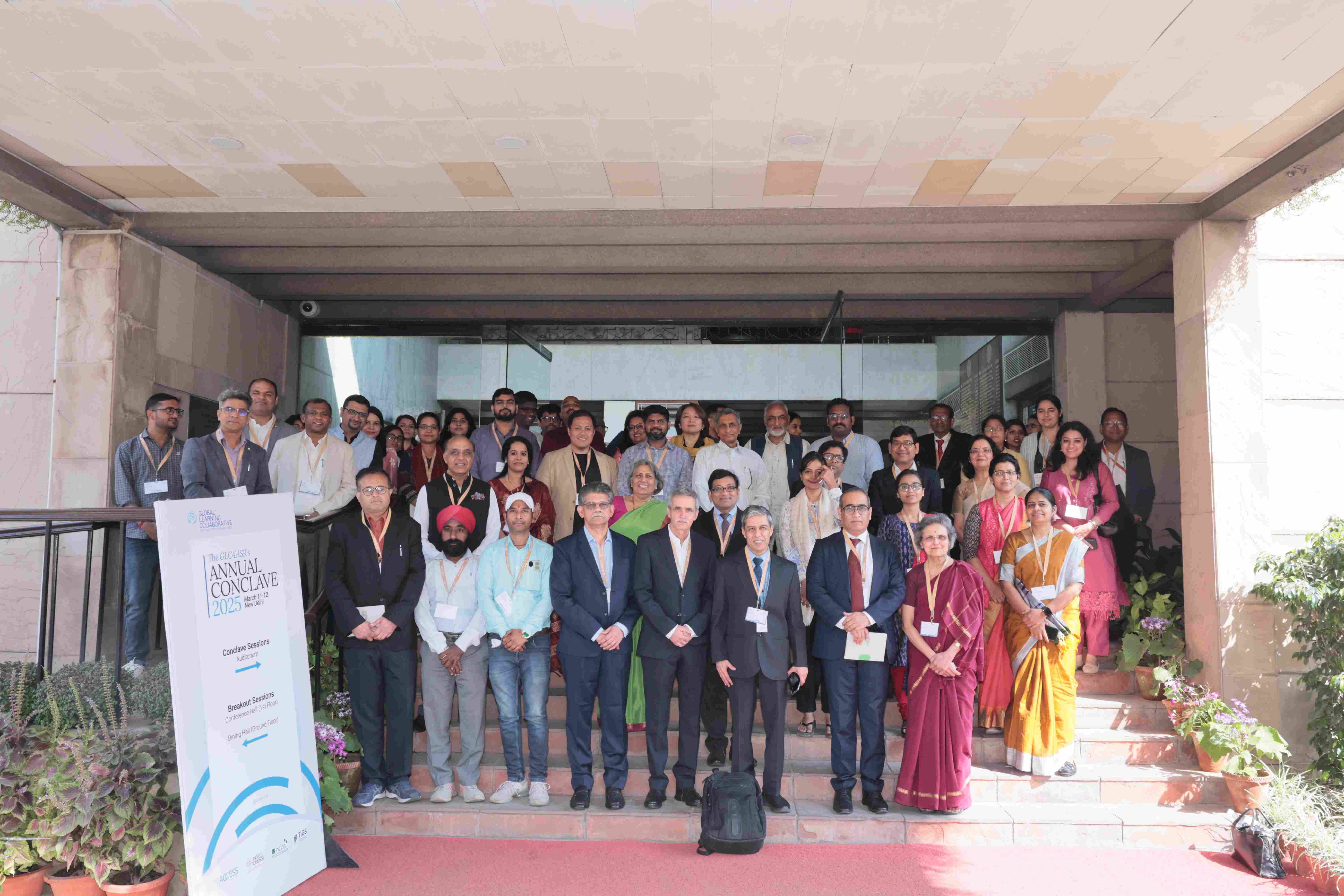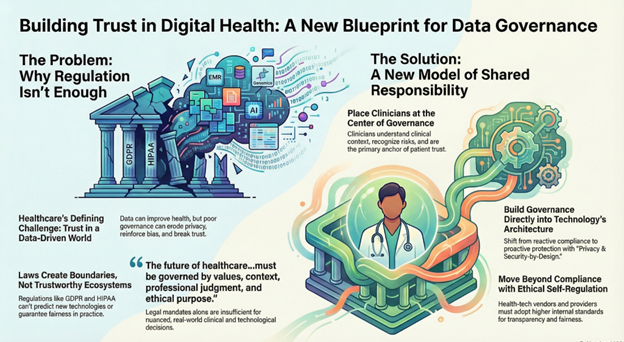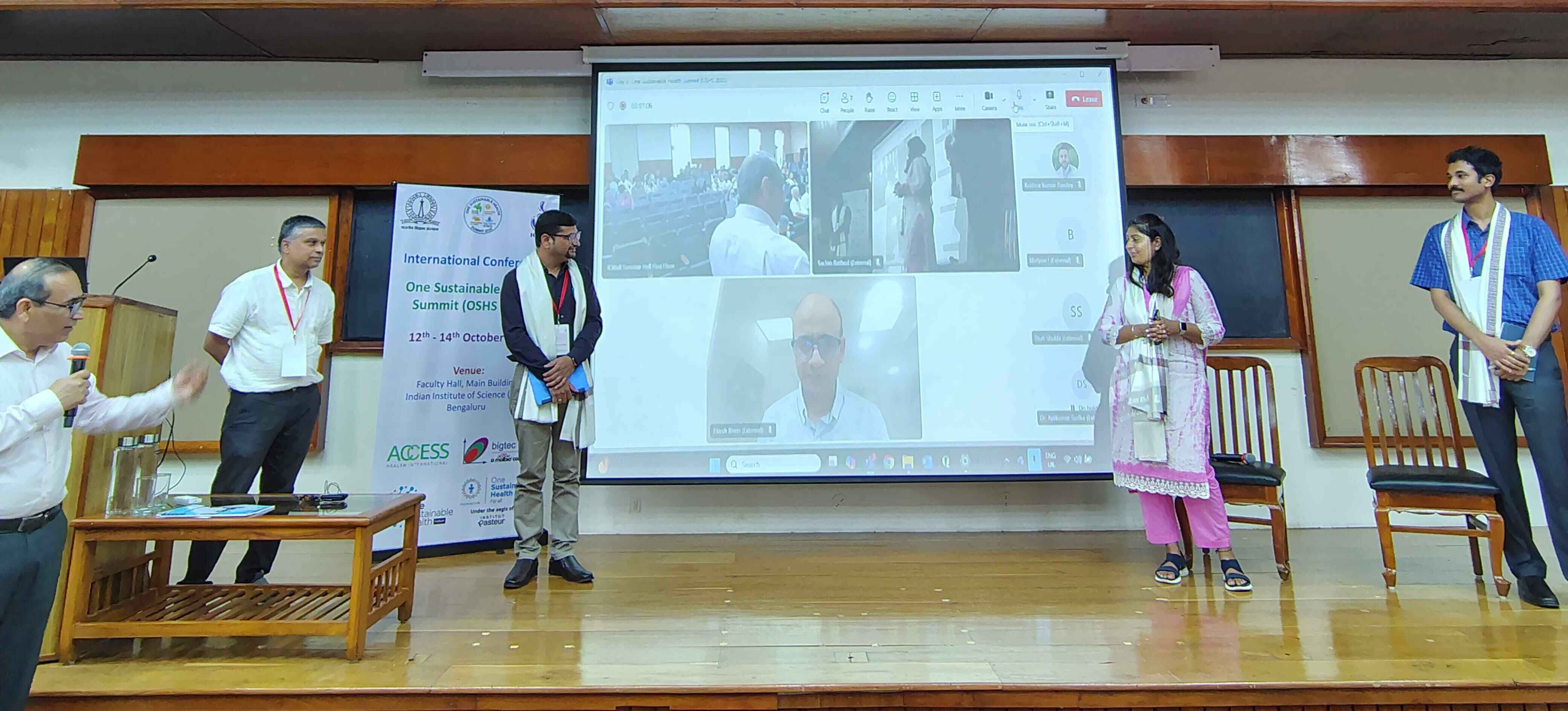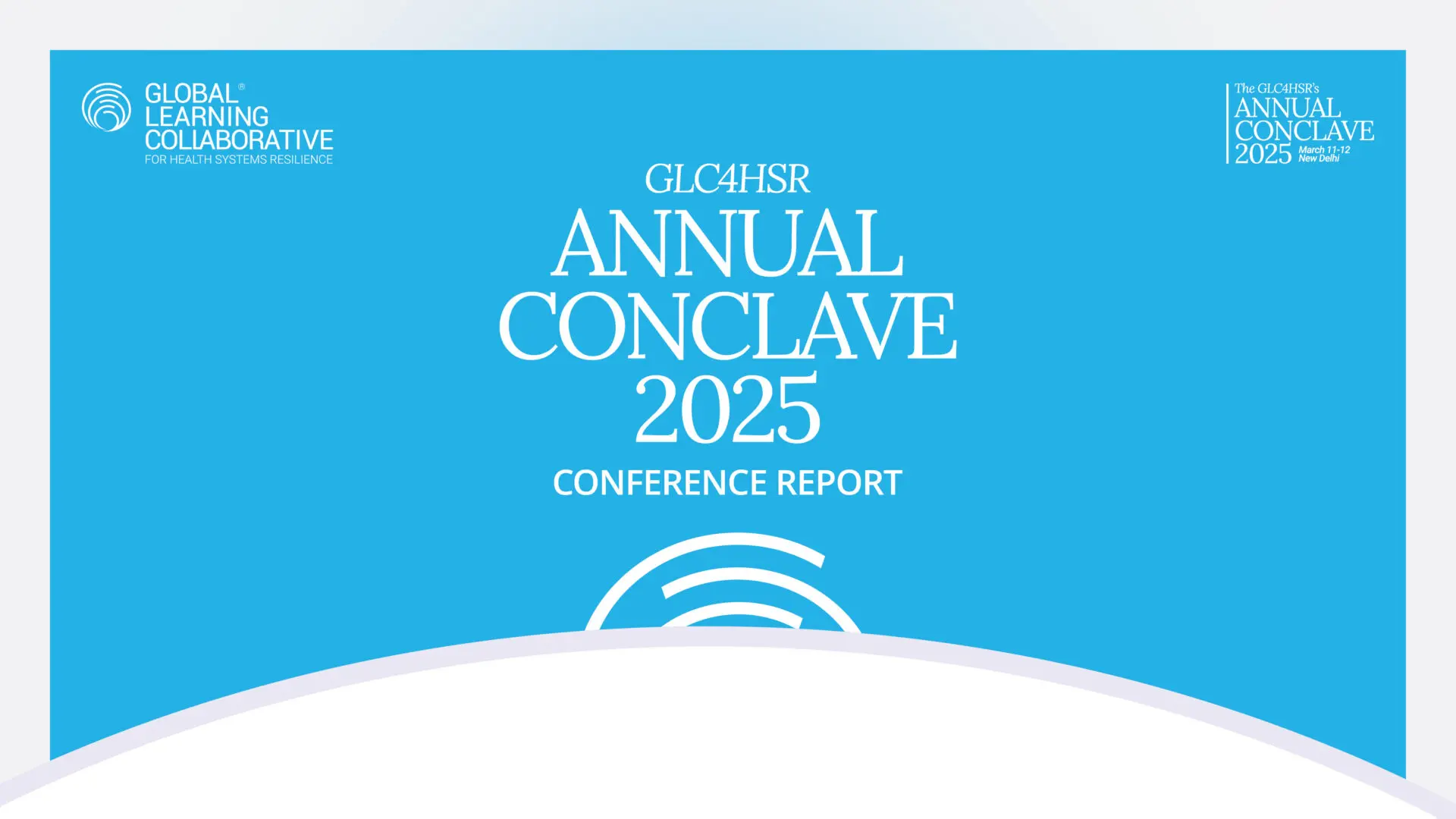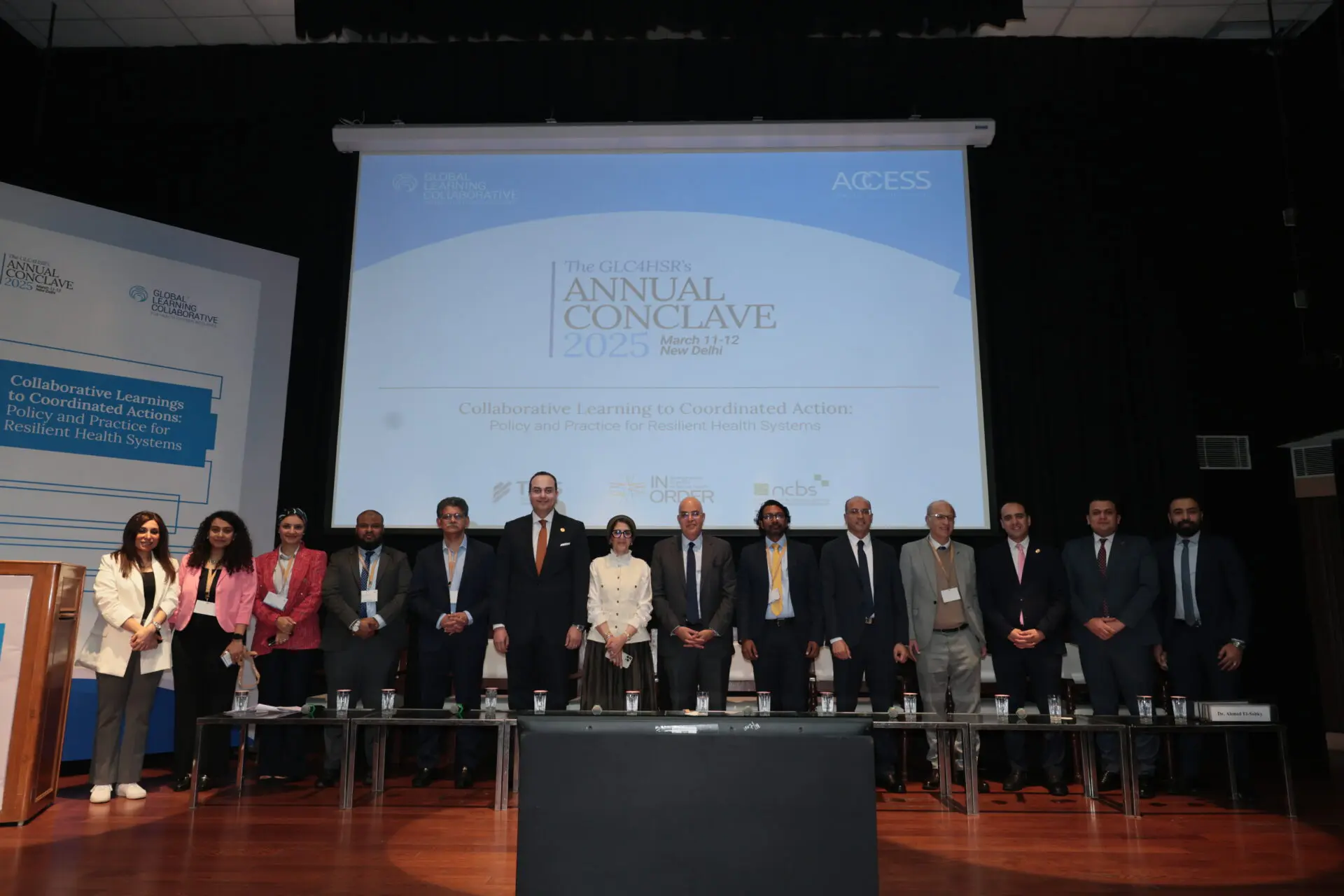GLC4HSR concludes Annual Conclave 2025: Advances Dialogue Future-ready Health Systems
Updates ▪ Mar 19, 2025
The Global Learning Collaborative for Health Systems Resilience (GLC4HSR) successfully held its 2025 Annual Conclave on March 11-12 at the Indian National Science Academy, New Delhi. The event brought together experts, researchers, and policymakers to discuss ways to make healthcare systems stronger and more adaptable.
With 11 main sessions, 3 breakout discussions, more than 70 expert speakers, nearly 200 in-person attendees, and participants from 18 plus countries - plus many more joining online - the event was a hub for sharing knowledge, experiences, and innovative ideas. Over two days, participants explored how to prepare healthcare systems for future challenges while ensuring fair and sustainable healthcare access for all.
A Gathering of Experts and Innovators
The Conclave created a space for professionals from different fields to collaborate and share their expertise on improving health systems resilience. The discussions focused on identifying weaknesses in healthcare systems and finding solutions to make them stronger. By combining insights from public health, technology, and policy, participants highlighted the need for a well-rounded approach that includes governments, healthcare providers, researchers, and local communities.
Conclave Sessions at a Glance
- Co-Creating Pathways to Community Empowerment for Resilient Health Systems
- Climate Change and Health Systems: Localized Action for Climate Resilience
- The Way Forward for Building Better Surveillance-Alert-Response Systems
- Enhancing Health Systems Resilience in Conflict and Mass Displacement Contexts
- Building Resilience Against NCDs: The Silent Pandemic
- Strengthening Supply Chains for Health System Resilience
- The Case for Priority Setting & Driving Efficiency in Health Financing for Resilience
- Resilient Health Workforce: Preparing for the Future of Health Systems
- Disaster Resilient Infrastructure: Strengthening Health Systems for Crisis Preparedness
- Future-Proofing Healthcare: Digital Strategies for Resilience
- Breakout Sessions:
- Roundtable on Digital Competency of Human Resources for Health
- Focused Group Discussion on Leadership and Governance in Health
- Workshop on Supportive Supervision of Community Health Workers
Key Themes and Insights
Strengthening Governance and Local Decision-Making
Expert speakers emphasized the importance of flexible and evidence-based decision-making in healthcare. They discussed the need for governments to decentralize healthcare management, allowing local organizations to play a larger role. Using data to make informed decisions and ensuring that resources are fairly distributed were also highlighted as essential steps in making healthcare systems more resilient. Many experts stressed that empowering local communities to take part in health decisions leads to better outcomes.
Practical Approaches to Resilience and Adaptation
Breakout sessions explored specific topics in-depth, with case study presentations providing real-world examples of resilience-building efforts. These discussions showcased both successes and challenges in healthcare policies and programs. Topics included digital competency in human resources for health (HRH), leadership and governance in health, and supportive supervision of community health workers.
Leveraging Technology and Research for Health Systems
Poster presentations featured new research on how health systems can use technology and community-led approaches to improve resilience. Several studies explored how artificial intelligence and big data can help predict health emergencies before they happen. Others looked at how financial protections, such as affordable health insurance programs, can help low-income populations access healthcare even during crises.
Enhancing Global Collaboration for Health Resilience
Throughout the Conclave, participants emphasized the importance of international collaboration in strengthening health systems. Experts agreed that countries should work together to share research, resources, and best practices. Strengthening regional networks for pandemic preparedness was also a major topic, with discussions on how shared resources and training programs can improve emergency response.
Dignitaries and Thought Leaders
The event featured addresses and panel discussions by notable dignitaries, including Mr. Siddharth Sharma – CEO, Tata Trusts; Mr. Manoj Jhalani – Director, Department of Health Systems Development, WHO SEARO; Dr. Yupadee Sirisinsuk – Deputy Secretary-General, National Health Security Office, Government of Thailand; Dr. Sohel Saikat – Senior Advisor, Primary Health Care and Lead: Health Systems Resilience and EPHFs, World Health Organization; Dr. Jayaprakash Narayana – Founder, Foundation for Democratic Reforms; Former Public Administrator; Brigadier General Engineer Ahmed Salah – Chairman Advisor for Medical Equipment, Unified Procurement Authority, Egypt; Dr. Ahmed El-Sobky – Chairman, Egypt Healthcare Authority; Dr. Aida Karazhanova – Economic Affairs Officer, UN Economic and Social Commission for Asia and the Pacific; Mr. Andrew Wiltshire – Head of Healthcare Public Policy APJ, Amazon Web Services; Prof. (Dr.) D. Prabhakaran – Executive Director, Centre for Chronic Disease Control, India; Ms. Diah Satyani Saminarsih – Founder and CEO, Center for Indonesia’s Strategic Development Initiatives; Prof. (Dr.) Fathy Ibrahim – CEO, Acdima International, Egypt; Dr. Girish Kapur – Senior Vice President - India Site Operations, US Pharmacopeia; Mr. Jai Ganesh Udayasankaran – Executive Director, Asia eHealth Information Network (AeHIN); Prof. (Dr.) John Lim – Executive Director, Duke-NUS Centre of Regulatory Excellence; Dr. Karthik Adapa – Regional Advisor - Digital Health, WHO SEARO; Ms. Mai Farid – CEO, Universal Health Insurance Authority, Egypt; Prof. (Dr.) Mala Rao – Director, Ethnicity and Health Unit & Senior Clinical Fellow, Department of Primary Care and Public Health, Imperial College London; Dr. Oscar Primadi – Former Secretary General, Ministry of Health, Indonesia; Mr. R. Prasana – Secretary, Higher Education Department, Government of Chhattisgarh, India; and Mr. Rajiv Lall – Former Managing Director & Chairman, IDFC Bank, India among others.
Networking and Partnership Development
Beyond formal sessions, the Conclave provided ample networking opportunities. On the evening of March 11, a special networking dinner was held, offering attendees a chance to build connections and foster collaborations in an informal setting. This dinner allowed participants to engage with peers, discuss emerging challenges, and explore opportunities for future partnerships in a relaxed environment.
Acknowledging Our Partners
The event was co-hosted by ACCESS Health International, National Centre for Biological Sciences, Tata Institute for Genetics and Society, and InOrder - The Health Systems Institute.
The event was supported by US Pharmacopeia, Relysis Medical Devices, Boston Scientific, and Amazon Web Services.
The event partners included the Alliance for Pathogen Surveillance Innovation, Asia eHealth Information Network, Global Journal of Medicine & Public Health, The George Institute for Global Health, Center for Indonesia’s Strategic Development Initiatives, Asia Pacific Action Alliance on Human Resources for Health, Health Systems Global, Coalition for Disaster Resilient Infrastructure, and the Asia-Pacific Cardiovascular Disease Alliance.
Moving Forward: Next Steps for Strengthening Health Systems
As the insights from the Conclave are compiled into policy recommendations, GLC4HSR is committed to ensuring that the discussions lead to real-world action. Future research projects, policy discussions, and collaborations will be shaped by the knowledge exchanged during the event. A key focus will be on translating research into actionable strategies that can be implemented across diverse health system settings.
GLC4HSR thanks all the speakers, partners, and attendees for making this Conclave a success. A detailed summary of key discussions and findings will soon be available on the GLC4HSR website. We encourage continued engagement as we work together to build stronger, more resilient health systems for the future.


